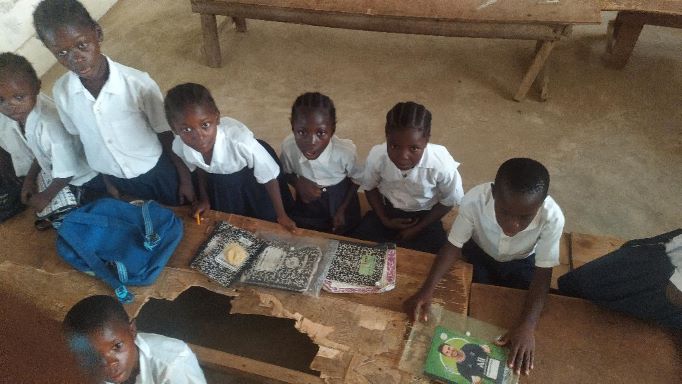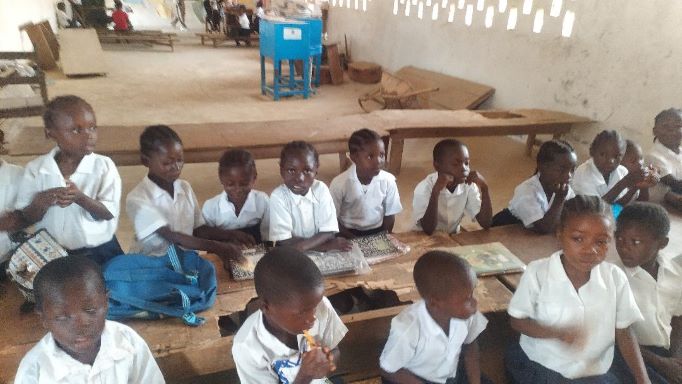By King Brown with New Narratives
BUCHANAN, Liberia- Sarah tries to follow their teacher’s directions to copy her letters. Learning the alphabet is hard for most kindergarten students but these two have an extra challenge: they are sitting on the floor.
Sarah, age 7, is a student at Four Houses Public School in Buchanan. The classroom has 45 students squeezed onto three 10-foot benches and one small table. About 15 students are seated on each bench. They jostle for time on the table. Most give up and end up on the floor.
It is sapping Sarah’s love of learning. “We cannot write well. Right now we are in dying in need of chairs,” she said.
It’s not just chairs and tables that are missing. There’s no blackboard; the roof is threatening to blow off and pests are eating up the ceiling and wood.
“The children are suffering. No better seating and writing place for them. Most of them hardly write well since we opened this year,” said Madam Ellen Flamah, the kindergarten teacher.
Madam Flamah said about 25 children dropped from her class this year because of the lack of seats. She expects more to leave before the end of the year. She expresses the frustration of many teachers and parents here. “I’m appealing to the Ministry of Education and government to provide chairs for students and renovate our building.”
Liberia’s education lags far behind many countries in the region, plagued by corruption, mismanagement, teacher shortages and a lack of funding. 15 to 20 percent of school aged children are not in class – one of the world’s highest rates. A third of primary teachers and 29 percent of secondary instructors are unqualified. Most schools are in need of renovation.
The lack of chairs is one area the government has very publicly promised to address. In 2022 President George Weah held a press conference promising 100,000 chairs for public schools across the country at a cost of $US2m before the opening of school year of 2022/2023. The president subsequently admitted only 24,000 chairs had been produced and distributed. He said the remaining 76,000 chairs would soon be delivered soon.

More than 1000 of the chairs made it to Grand Bassa according to Nathaniel Cisco, County Education Officer. But they did not go far. Mr. Cisco said 86 percent of the county’s 306 schools do not have enough seats for the 67,000 students. Chairs have gone to 21 public schools in the seven educational districts in Grand Bassa. Each received at least 150 chairs.
It’s not nearly enough according to Daniel Biah District Education Officer who controls 30 schools, with 3071 students in his district. Two hundred chairs went to the Gorblee Central High School which has about 900 students, for instance. The Parent and Teachers Association produced another 400 but they are still 300 short.
“Every year we cry for the lack of chairs and other needed support for our schools but nothing can be done. I have spoken to MOE to help but up to present we have not heard nothing from them,” Biah said.
In Buchanan District, 150 chairs were shared among three public schools according to Dominic Broh, the District Education officer. The same happened in In District 1. Children at the Lloydsville and Via Town public schools are taking lessons on the floor due to the lack of chair according to DEO James Davis.
Davis said students share seats meant for one person while others bring chairs purchased by parents who can afford them. Davis feels shame seeing the schools like this.
“Children are sitting on planks, stones, blocks and sticks just to acquire quality education and there is a need that MOE come to the aid of these schools,” Davis said.
Grand Bassa schools share all the other challenges facing schools in the country. CEO Cisco said there are just 1700 paid teachers for the district’s 67,000 students or 1 teacher for 40 students. He estimates 60 percent of the schools need massive renovation.
The situation was catastrophic for more than 200 students of the Yanwin public school in District 1. These students had to abandon school last year because of the lack of teaching materials, seats, blackboards and books. The roof blew off two years ago and has never been replaced.
Barley Togba, Grand Bassa Civil Society Organization Chairman, said he was saddened that not even 50,000 of the 100,000 chairs the government promised distributed. He said it was bad for the government to make a promise in this crucial area of the country’s development and not fulfill it. He looked admiringly across the border to Ivory Coast where schoolchildren are doing far better.
No chairs have yet made it to Four Houses public school.
“Sometimes I feel frustrated seeing our school like this,” said Principal John Sweegay. “It’s bad MOE distributed chairs and did not give us anything after submitting several reports. But there are more than 30 public schools in our district so what 150 chairs will even do?”
Four Houses Public School is the only institution providing quality education to more than 400 children from kindergarten to 7th grade in the Four Houses community and neighboring areas. On top of missing chairs, the school also deals with a shortage of teachers, limited textbooks and a leaking building.
“We struggled to teach every day and we evaluated our students and realized most of them are not getting the lessons well as a result of these challenges,” said Venletino Anthony Garwon, Four Houses Public School Registrar.
“When you are crying, people think you are making fun, no support coming from anywhere to run this school. Our people built this school and gave it to government but it’s bad the way they are treating this school,” Principal Sweegay.
Teachers here say without a serious step up in investment in the schools, another generation of Liberians will miss out on the tremendous advantages that come from an education.
This story was a collaboration with New Narratives as part of its Investigating Liberia project. Funding was provided by the Swedish Embassy in Liberia. The funder had no say in the story’s content.

